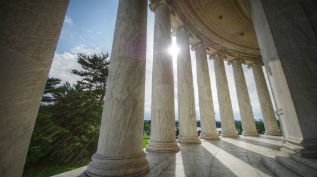Philanthropy Supports Democracy, Democracy Supports Us All

Results of the recent election season have spotlighted the tremendous divisiveness in our nation – divisiveness that colors our approach to our country, our government and each other.
As this year comes to a close, I want to remind readers — of every political point of view — about the critical role that philanthropy can play in advocating not only for our communities, but also for the fundamental principles that have enabled the success of our unique democracy for nearly 230 years.
Principles of democracy
The principles enunciated in the Declaration of Independence and enshrined in the Constitution and Bill of Rights have made our experiment in governance and civil society the most successful in history.
These include the bedrock concept that “all men are created equal, that they are endowed by their Creator with certain unalienable Rights, that among these are Life, Liberty and the Pursuit of Happiness.”
The Constitution created the government and established the rule of law, separation of powers, representative democracy, checks and balances, federalism and civilian military control.
The Bill of Rights set limits on the government’s power and grants citizens protection from abuse of that power. It was Thomas Jefferson who said, “Experience hath shewn, that even under the best forms of government those entrusted with power have, in time, and by slow operations, perverted it into tyranny.”
It makes no difference if you are liberal or conservative – or somewhere in between. It makes no difference how you feel about the results of the recent elections. The value of the American concept of self-government lies in transpartisan democratic principles that protect us all. These must be protected, preserved and enhanced by individuals of all parties and diverse social perspectives.
To read some of these writings of our Founding Fathers that explore the meaning of these principles, see Founders Online, an online resource (supported by a number of foundations) to make our nation’s historical documents available to all.
Philanthropy can protect democracy
Historically, nonprofit organizations have played an important role in helping to shape the meaning and application of citizens’ rights. Through advocacy, education, and litigation, nonprofits have helped to define and defend our democratic values when they have come under attack.
There are many opportunities to support – financially and with one’s time — organizations that advocate for the essential precepts embodied in our founding documents. Among these are local, regional and national nonprofit organizations that work tirelessly to promote and insure:
- The ability to follow the faith of one’s choice, including no faith at all;
- The restriction on government promotion of any particular faith;
- The separation of church and state;
- Equal treatment under the law;
- A free press;
- Freedom of speech;
- The right to assemble and peacefully protest;
- The right to privacy;
- The right to vote;
- The right to bear arms;
- Protection against cruel and unusual punishment;
- The right to due process and the assistance of counsel;
- and more.
These rights recognize and codify both our independence and fundamental interdependence as a civil society. Jefferson also said, “It behooves our citizens to be on their guard, to be firm in their principles, and full of confidence in themselves.” Moreover, he cautioned that “lethargy is the forerunner of death to the public liberty.”
As you contemplate year-end giving and make plans for 2017, think not only about where you can meet the immediate needs of your community — but also where you also can invest to ensure the endurance of our democracy. Philanthropy can be a deeply optimistic act — reflecting the belief that we can have a positive impact on our own lives, on the lives of others, and on vital societal issues.
To quote Jefferson once more: “The people of every country are the only safe guardians of their own rights, and are the only instruments which can be used for their destruction.”
